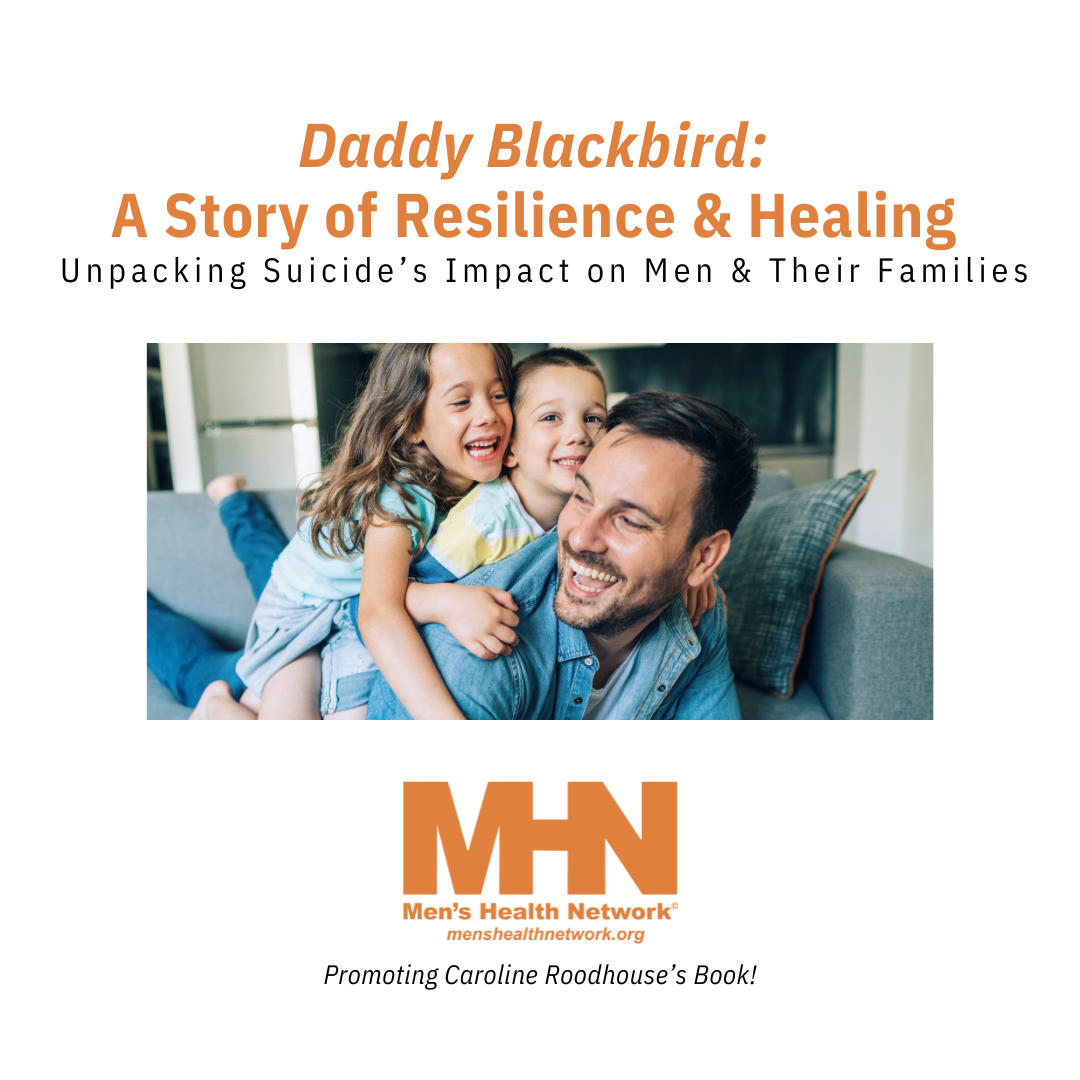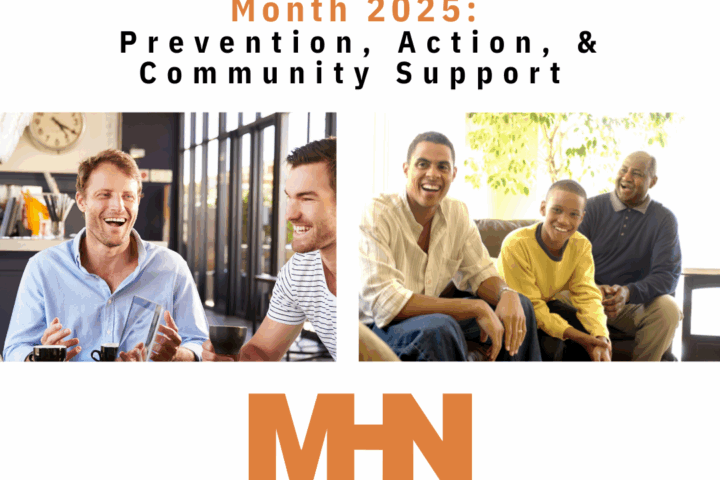Daddy Blackbird: A Story of Resilience and Healing
Unpacking Suicide’s Impact on Men and Their Families
On October 10, 2024, World Mental Health Day, Daddy Blackbird by Caroline Roodhouse made its debut—a powerful release that offers a profound look into the unique challenges men face with mental health, particularly when struggles remain unspoken. This deeply personal book sheds light on the lasting impact of suicide on a family left behind to grapple with grief and stigma, offering a compassionate resource for understanding how such a tragedy affects men, their mental health, and the families who survive them.
The release of Daddy Blackbird comes at a critical time. The latest data from the Office for National Statistics (ONS) in England and Wales shows that suicide rates among men remain alarmingly high, with over 6,000 deaths last year—the highest rate in more than two decades. This harrowing statistic underscores the urgent need to address men’s mental health challenges and dismantle the stigma that often surrounds them.
Caroline’s story provides an essential avenue for discussing these issues openly and fostering empathy and understanding.
The Untold Story of Men’s Mental Health and Suicide
Caroline Roodhouse lost her husband, Steve, to suicide in 2018.
As she recalls, “When my husband, Steve, left for work that morning, I had no idea what was coming for my girls and me in the following days, weeks, and years.”
Steve’s death left Caroline and their young daughters, Evie and Ada, in shock and profound grief. His passing also left a legacy of unanswered questions—a situation that tragically echoes for many families affected by suicide, especially those where mental health struggles went unvoiced.
Steve’s story is one of the countless cases where mental health battles among men are hidden from view, often due to societal expectations that discourage vulnerability in men. Many men internalize stress and emotional pain, avoiding conversations about their struggles. While Steve’s reasons for taking his life remain unknown, his story resonates with a growing number of men and their families who find it difficult to speak up, fearing judgment or rejection.
In Daddy Blackbird, Caroline shares her experience with honesty and openness, creating a rare opportunity to discuss the toll of untreated mental health struggles on men. Her account challenges societal norms and provides a powerful reminder that men, too, need support, understanding, and spaces where they feel comfortable opening up.
Breaking the Stigma: Why Talking About Men’s Mental Health Matters
One of the greatest challenges Caroline has faced is navigating the stigma surrounding suicide. Survivors often feel isolated and may struggle with their own mental health as they process the trauma. Many survivors of suicide loss report a heightened risk of depression, anxiety, and post-traumatic stress.
By bringing her story to light, Caroline hopes to challenge this stigma, particularly for men who are often told to “be strong” and “keep going” rather than seek help.
Caroline’s courage in sharing her experience is an invitation for men, their loved ones, and society as a whole to confront the taboo around mental health and suicide. She advocates for honest conversations about mental health in everyday settings—whether that’s among friends, family members, or colleagues. This approach not only builds empathy but can also be a preventive measure, fostering an environment where men feel empowered to seek help without fear of judgment.
Connecting Men’s Mental Health to Family and Legacy
For many men, the weight of providing for their families and living up to societal expectations can be overwhelming. Steve’s sudden death not only impacted Caroline but left their daughters, Evie and Ada, grappling with the loss of their father. Caroline’s journey through grief involved helping her daughters process their emotions, something that Rachel Vecht, founder of Educating Matters, found especially profound:
“Particularly captivating is how Caroline supports her girls with the loss of their father. A profound example of the importance of teaching children how to understand and navigate emotions.”
Through her approach to supporting her daughters, Caroline underscores a crucial lesson:
Teaching boys and young men to understand, express, and manage their emotions is fundamental for their mental well-being and can prevent future tragedies.
By fostering emotional literacy from a young age, we help dismantle the harmful belief that vulnerability is weakness, paving the way for men to grow up feeling comfortable with seeking help and talking about their struggles.
This message is especially relevant in a society where men are often expected to “be tough” and suppress their emotions. The consequences of this mindset are clear in the suicide statistics, which disproportionately affect men. By encouraging boys and men to engage in discussions about their feelings, we lay the foundation for healthier, more connected relationships and communities.
A Resource for Men, Their Families, and Their Communities
For those who have experienced loss, Daddy Blackbird offers solace. Jodie Cooper, a fellow suicide loss survivor, reflects, “There are so many ‘yes, I felt like that too’ moments, which makes me feel much less alone in my grief. Caroline doesn’t shy away from taboo subjects like anger, which I had struggled to find honest accounts of elsewhere.” Caroline’s willingness to address anger—a common but often unspoken reaction in the grieving process—resonates deeply with survivors. This book provides an essential resource for men who may feel disconnected from traditional grief support, as well as for families who are learning to live with a profound absence in their lives.
Daddy Blackbird is not only for those personally touched by suicide but also for anyone seeking to understand the complex mental health needs of men and boys. It is a valuable guide for those in roles of influence, such as teachers, coaches, mentors, and mental health professionals, who wish to support men in a compassionate, nonjudgmental way. By fostering awareness and empathy, the book becomes a stepping stone to addressing mental health challenges across society.
Building Resilience and Community Through Shared Stories
As Caroline’s story unfolds, it becomes clear that resilience is not about ignoring pain or moving on without addressing grief; rather, it is about embracing healing in all its forms. For men, this might mean finding strength in relationships, reconnecting with their values, and, like Caroline, discovering hope even in the most difficult moments. Community plays a crucial role in this journey, and Daddy Blackbird reminds us that healing is often a collective process, relying on the support and understanding of family, friends, and mental health advocates.
Amandip Sidhu, founder of Doctors in Distress, captures the spirit of Caroline’s journey perfectly:
“This book speaks volumes about the experiences of being bereaved by a traumatic loss, yet leaves the reader speechless in awe. It is an amazing story of resilience, humbleness, and raw emotion.”
Sidhu’s work, aimed at supporting those in crisis, reflects the very themes Caroline brings to life in her book—compassion, resilience, and the importance of community support for men facing mental health struggles.
A Timely Read
Daddy Blackbird is more than just a memoir—it is a call to action for anyone invested in improving men’s mental health. Its release on World Mental Health Day is symbolic, serving as a reminder of the need for empathy, understanding, and open dialogue around men’s mental health.
For some, reading Caroline’s story may be the first step toward reaching out to a loved one, seeking help, or even volunteering to raise awareness for suicide prevention.
This book invites us to reimagine how we support men’s mental, physical, and spiritual health by fostering environments that encourage openness, empathy, and genuine connection. While healing from suicide loss is not easy, Daddy Blackbird illustrates that it is possible to rebuild, find peace, and even thrive.
Its message is one of hope, resilience, and the importance of addressing men’s mental health before it becomes a crisis.
Daddy Blackbird offers a moving tribute to Steve’s life and the strength of his family—a story that will resonate with anyone committed to supporting the health and well-being of men and boys.
Daddy Blackbird is available for purchase on Amazon.
For more information about Caroline and her work, visit daddyblackbird.com or contact her via email at [email protected].




